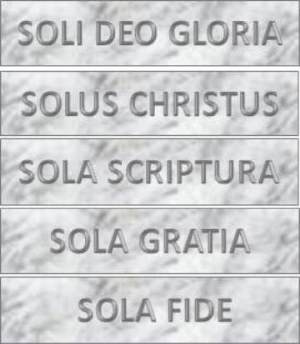EXPLORING THE WORD
Faith Alone (Sola Fide)
CG

The first slogan we will look at is faith alone, or more precisely justification by faith alone. What did the Reformers mean by this phrase? To answer this question, we need to have an understanding of what is meant by justification. Justification is a legal term and, biblically speaking, it refers to one's legal standing before God. Do we have a legal standing before God? Absolutely! Because of the fall into sin (Genesis 3:1-24), Adam and all his descendents were judicially declared guilty before God (Romans 5:12-21). We are dead in our sins and trespasses (Ephesians 2:1) and unable to make ourselves right (or non-guilty) before God.
Justification by faith alone is the answer to our guilt problem before God. How a man (a woman, a person) is made right – justified – before God is through faith alone. This begs the question: Faith in what? Or more precisely, faith in whom? Paul, in his letter to the church in Rome (not the Roman Catholic Church), wrote, "For there is no distinction: for all have sinned and fall short of the glory of God, and are justified by his grace as a gift, through the redemption that is in Christ Jesus, whom God put forward as a propitiation by his blood, to be received by faith" (Romans 3:22-25). We are justified by faith alone in Christ Jesus.
Another question that can be asked is how is this controversial? How does justification by faith alone differ from the teachings of the Roman Catholic Church? In the Council of Trent (1545 – 1563), the Catholic Church responded to the teachings of the Protestant Reformers, and in the sixth session (1547) they declared as heresy the doctrine of justification by faith alone (see canons IX, X and XI of the sixth session). Rome's doctrine of justification is to say that faith is a necessary ingredient of justification, but that it is not sufficient. We must combine with our faith good works. This is not to say that Rome believes in "works righteousness." What Rome sees as justification is what Protestants see as the process of sanctification; i.e., the process of growing in practical holiness (putting off sin and growing in righteousness). Roman Catholics see the two as inseparable, whereas Protestants see them as distinct because the bible sees them as distinct.
So we are justified by faith alone, but how exactly is this accomplished? Roman Catholic critics will claim that the doctrine of Sola Fide is a "legal fiction." The way this works is through imputation. Imputation is a technical word that means, "to ascribe something to someone by virtue of a similar quality in another." In the sense of justification, it is imputed to Christians through their faith in Christ. To put it another way, the perfect righteousness of Christ is imputed to Christians through their faith (2 Corinthians 5:21). Jesus Christ lived a perfectly sinless life in complete obedience to the law of God. He did so because we, through our sin, could not fulfill the law of God. He then died on the cross in order to pay the ransom for our sins (1 Peter 1:18-19). Our faith, then, acts like a conduit through which the righteousness of Christ is imputed to us and our sin is imputed to Christ. Therefore, we who believe and trust in Christ can righty say that our sins were paid for on the cross (Colossians 2:13-14) and that we are now holy and blameless in God's sight (Colossians 1:21-22). Justified by faith alone in Christ alone!
Soli Deo Gloria!
CFG
The Series:
Faith Alone (Sola Fide): Rome calls "faith alone" a legal fiction; is it something more?
Scripture Alone (Sola Scriptura): Is Scripture really the sole source of inspired authority?
Grace Alone (Sola Gratia): What does God do and what does man do in salvation?
Christ Alone (Solus Christus): Is Christ or the church mediator between God and man?
The Glory of God Alone (Soli Deo Gloria): Does man do nothing to merit his salvation?
comments powered by Disqus
Republished 5-20-2013

